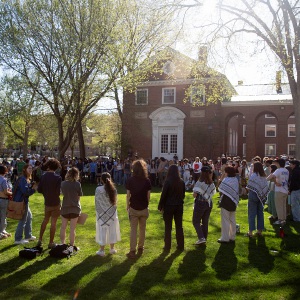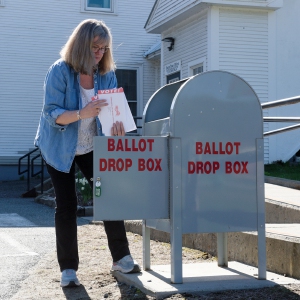Forum for March 4, 2024: Support for Hanover school budget
| Published: 03-04-2024 11:31 AM |
On Tuesday, March 5, Hanover voters will decide whether to approve a Hanover School District collective bargaining agreement and the FY25 proposed budget.
The Hanover Finance Committee (HFC) unanimously supports the agreement with teachers in Article 4 and the Hanover School District budget in Article 5. Overall, expenditures are increasing by 2% over FY24. After factoring in revenues, which are down 17%, the Hanover District assessment is expected to increase 8%.
When combined with the minimal increase from Dresden, and if all warrant articles were to pass, then the total school tax rate would increase by $.30 to $11.57 per $1,000 of property value or by 2.6%. The owner of a $500,000 home would pay an additional $150 per year, bringing the total school tax bill for the home to $5,785.
HFC supports the implementation of Zero Based Budgeting (ZBB) this year in the annual budgeting process. HFC applauds the effort and recognizes the benefit to the Hanover School District by aligning their budget to their mission, vision and strategic plan by using ZBB.
Although contract costs contribute significantly to the budget, HFC recognizes the importance of hiring and retaining quality staff. This means keeping salaries competitive and ensuring that compensation is commensurate with pre-inflation levels for staff who have only been eligible for 2% increases in recent years.
More information can be found at SAU70.org and in the mailer. Voting is March 5 at Hanover High School.
Greg Snyder
Hanover
Article continues after...
Yesterday's Most Read Articles
 Dartmouth administration faces fierce criticism over protest arrests
Dartmouth administration faces fierce criticism over protest arrests
 Hanover house added to New Hampshire Register of Historic Places
Hanover house added to New Hampshire Register of Historic Places
 Sharon voters turn back proposal to renovate school
Sharon voters turn back proposal to renovate school
The writer is vice chair of the Hanover Finance Committee.
College awakening
In William Wittik’s latest bi-weekly admonition over the loss of conservative values in modern society (“When Dartmouth went woke,” Feb. 20), he trivializes two serious issues at Dartmouth, a venerable institution with an entrenched history of white, straight, Christian male primacy. The first is sexual assault, which he appears to believe is an exaggerated claim of the “MeToo” movement, and the second is inclusivity, which he derides as the result of Dartmouth becoming “woke.”
The incidents of professional misconduct in the Department of Psychological and Brain Sciences were heinous examples of the power differential between faculty and students. While Wittik refers to “several graduate students and teaching assistants” bringing charges against the faculty, the college’s lawsuit settlement identified 90 members of the “class action” as potential survivors. Some of these students were coerced into providing sexual favors to tenured professors whose recommendations could make or break their careers. They came to Dartmouth to find mentors and instead met molesters. What happened in PBS could be classified as criminal.
As to inclusivity, when Dartmouth opened its doors to women, it also increased its commitment to diversity. These decisions were more than political statements; they were a competitive necessity. To make its aspirations reality, the college had to make its environment more welcoming, which was no easy task. The weathervane that Wittik mourns was an all too visible metaphor for an old myth that Native Americans would only benefit from the wise instruction of the white man, in this case Eleazar Wheelock. Read some history of Samson Occom to see how that worked out.
As a Valley News reader, William Wittik has every right to comment on the content of the newspaper. However, he should refrain from cherry-picking examples to substantiate his cultural beliefs without acknowledging their full history and context. A Wall Street executive once told a group at Dartmouth that colleges were like businesses: they either got better, or they got worse, but they did not stay the same. They evolved, and so has Dartmouth. It “woke” up.
Stanley Colla
Hanover
Re-elect Cornish moderator
I’ve just read Gwyn Gallergher’s letter to the Town in Connect Cornish. I’m embarrassed to admit I didn’t know someone was running against Gwyn. Having watched him at work guiding the discussions during Town Meetings I can’t think why we would want to change our moderator. Knowledgeable, thoughtful, kind, patient, even-handed — all apply to his work at the podium. Gwyn is a Cornish man born and bred. I can’t think of a better person for moderator. I can’t think of a reason not to vote for him. Don’t forget we vote on Tuesday, March 12.
Cheston Newbold
Cornish
He’s no Mandela
Ten years ago, most of the world united in bidding farewell to South Africa’s former President Nelson Mandela, and in celebrating his long life. The United States was very much present at his December 2013 memorial service, and President Obama’s moving speech was warmly received by the attendees.
Today Mandela is seen here as a hero, but that was not always the case. From the 1960s on, Mandela and the African National Congress were regarded as terrorists by many US authorities, including New Hampshire’s then governor Meldrim Thomson Jr., who praised the apartheid regime, and Ronald Reagan who considered South Africa a key anti-communist ally.
Ex-president Donald Trump, in contrast, has not called Nelson Mandela a terrorist. Instead, at a New Hampshire campaign event he imagined that he, Trump, is also a victim of unjust persecution and compared himself to the man who spent 27 years in South African prisons before emerging to lead his nation out of decades of apartheid rule.
To many, that comparison seems absurd and egomaniacal. South Africa’s ruling African National Congress responded that Mandela’s dedication to “peace and a just society” stands in “stark contrast” to Trump’s policies.
Why is this still important? The United States must deal with terrorists and dictators, and with genuine freedom fighters and statesmen like Mandela. It is essential that we have leaders who, unlike Reagan, Thompson and Trump, can tell the difference.
John Lamperti
Norwich

 Editorial: Response to campus protests only adds fuel to the fire
Editorial: Response to campus protests only adds fuel to the fire Editorial: Chris Sununu’s moral vacuum
Editorial: Chris Sununu’s moral vacuum Editorial: Gambling tarnishes America’s sporting life
Editorial: Gambling tarnishes America’s sporting life By the Way: A white nationalist’s many mistruths
By the Way: A white nationalist’s many mistruths
